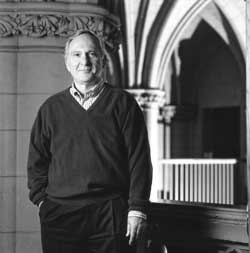How Old Are You Now?
Asking the right questions to assess math knowledge in kids
“Bear made a birthday wish: He wants you to count to a really big number because that’s how many presents he’ll get today.”
So begins The Birthday Party, a math skills assessment tool created by TC’s Herbert Ginsburg, the Jacob H. Schiff Foundation Professor of Psychology and Education. The Birthday Party addresses two challenges unique to the preschool milieu: Very young children will submit to an assessment only if they enjoy it, and their answers typically require additional probing and interpretation.
“In very young children, learning is informal, often through play, so a quality assessment has to be adaptive,” says Sandra Pappas, a former student of Ginsburg’s who is Project Director for The Birthday Party. “Often there’s more to children’s knowledge than you’d think because they’re not just learning about number operations but also about shape, pattern, color and space. The Birthday Party taps those skills, and it’s also a form of professional development that broadens teachers’ views of what constitutes math knowledge and skill.”
Put in simplest terms, The Birthday Party is an interview that teachers can conduct one-on-one with students, aided by computer prompts. The tool includes a flip-book that offers hints on how to cajole tongue-tied children to speak; how to recognize the seeds of understanding in a seemingly vague or confusing answer; and how and when to challenge a correct answer that may mask fundamental misconceptions or guesswork.
For example, a child may not answer “triangle” when asked to identify a three-sided shape but may, with prompting, be able to say that it is three-sided and that other shapes listed as possible answers are not. Or she may be able to count in sequence but may not yet have grasped the principle of cardinality—that is, that the last counting word (say, five) represents the numerical value of a whole set of objects (five apples).
The questions and hints offered by The Birthday Party are based on extensive research—much of it conducted by Ginsburg, who has spent thousands of hours observing young children in classrooms and at play. Teachers administering the assessment can log on to a site to watch videos of children behaving in ways that demonstrate specific forms of mathematical understanding and misconception, as well as clips of Ginsburg himself discussing the cognitive basis of his work. The Birthday Party also feeds assessment data to an online archive that is searchable by child, classroom or school.
The Birthday Party is still being developed, and plans for distribution are not yet in place. But Ginsburg—who has authored a widely admired curriculum called Big Math for Little Kids and collaborated with a software company on another assessment—is an eloquent spokesman for his work. As he put it in a television interview last year, “Our approach is that we need to build math instruction on the knowledge that the kids already have.”
Published Wednesday, May. 2, 2012
